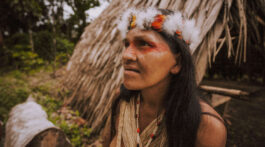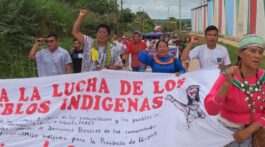
Los clientes del alojamiento de Wilderness Safaris en la CKGR se bañan en su piscina, mientras el Gobierno prohíbe a los bosquimanos que viven cerca utilizar un pozo de agua. © Survival
Wilderness Safaris abrió el Kalahari Plains Camp dentro de la Reserva de Caza del Kalahari Central en 2009, sin haber consultado antes a los bosquimanos, en cuyas tierras ancestrales se asienta el alojamiento. Éste cuenta con bar y piscina para los turistas, mientras que a los bosquimanos de la reserva se les prohíbe acceder a un pozo del que dependen para obtener agua.
En respuesta a las acusaciones de Survival, Wilderness Safaris dice que no puede dar agua a los bosquimanos en la reserva, alegando que “no es una proveedora de agua y que su modelo de negocio no es lo suficientemente robusto como para soportar esa responsabilidad”. Sin embargo, recientemente construyó molinos de viento en una concesión de Zimbabue para extraer agua para animales salvajes, y añadió: “Es gratificante verlos saciar su sed en el agua nueva”.
El Gobierno de Botsuana ha prohibido a los bosquimanos acceder a un pozo que el mismo Gobierno selló y tapó cuando los expulsó de la reserva en el año 2002. Con el apoyo de Survival, los bosquimanos obtuvieron una sentencia favorable del Tribunal Supremo que establecía que tienen el derecho a vivir en la reserva. Sin embargo, el Gobierno se niega a permitir que rehabiliten el pozo, obligándolos a hacer arduos viajes para traer agua desde fuera de la reserva.
Tanto el sobrino del presidente de Botsuana como su abogado personal forman parte de la Junta Directiva de Wilderness Safaris.
Wilderness Safaris ganó el premio de salud y será homenajeada en el Congreso Traveler World Savers de Condé Nast que se celebra en Singapur en octubre.
El director de Survival International, Stephen Corry, declaró hoy: “No se debería permitir que las empresas turísticas puedan ignorar los derechos de los pueblos indígenas, en cuyas tierras instalan sus hoteles y alojamientos. No vale con decir que es competencia del Gobierno y que no tiene nada que ver con la empresa: ésos son los argumentos que se han usado desde hace décadas para justificar la usurpación de las tierras de los pueblos indígenas. No debería haber turismo en lugares como la reserva de los bosquimanos en Botsuana mientras los propios bosquimanos son expulsados”.

Visitors to Wilderness Safaris' CKGR lodge bathein this pool - but the government bans Bushmenliving nearby from using a water borehole. © Survival
Wilderness Safaris opened the Kalahari Plains Camp inside the Central Kalahari Game Reserve in 2009, having failed to consult the Bushmen on whose ancestral lands the lodge sits. The lodge sports a bar and swimming pool for tourists, while Bushmen in the reserve are banned from accessing a well which they rely on for water.
Responding to Survival’s allegations, Wilderness Safaris says it cannot provide water to Bushmen in the reserve, claiming ‘it is not a water utility and its business model is not robust enough to carry this responsibility’. However, it recently constructed windmills on a concession in Zimbabwe to pump water for wildlife, adding, ‘it is gratifying to see them slake their thirst on the new water’.
The Botswana government has banned the Bushmen from accessing a well which it sealed and capped when it evicted them from the reserve in 2002. With Survival’s support, the Bushmen won a High Court ruling that said they have the right to live in the reserve. However, the government refuses to allow them to re-commission the well, forcing them to make arduous journeys to fetch water from outside the reserve.
Both the President of Botswana’s nephew, and his personal lawyer, sit on Wilderness Safaris’ board of directors.
Wilderness Safaris won the health award and will be honoured at the Condé Nast Traveler World Savers Congress in Singapore in October.
Survival International’s director, Stephen Corry, said today, ‘Tourist companies should no longer be able to brush off the rights of tribal peoples on whose lands they put their hotels and lodges. It’s not good enough to say it’s just the concern of the government and nothing to do with the company: these are the arguments used for decades to assist the dispossession of tribal peoples. Tourism has no role in places like the Bushmen’s reserve in Botswana while the Bushmen are being forced out.’












No Comment